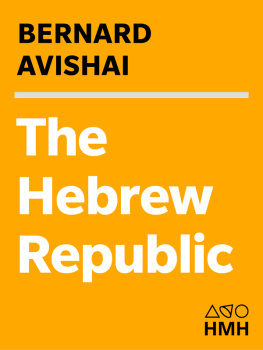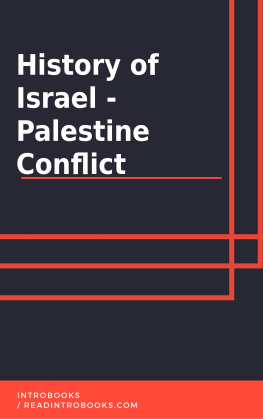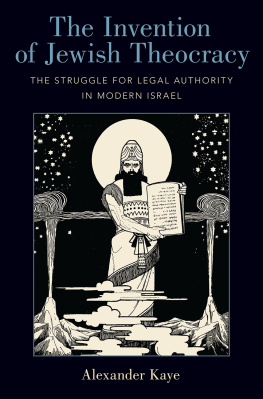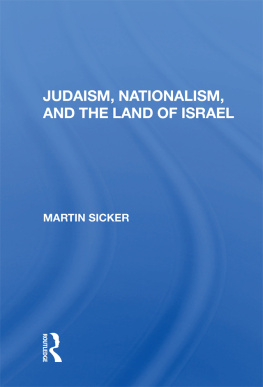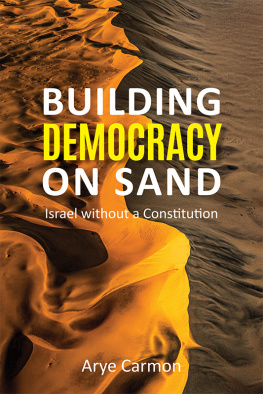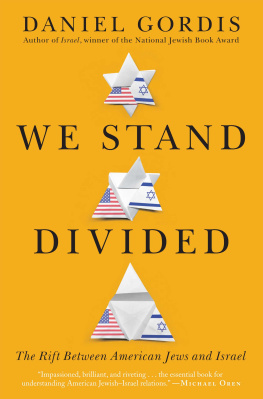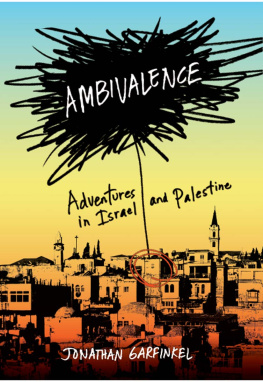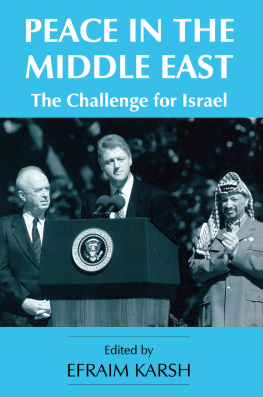ROUTLEDGE LIBRARY EDITIONS:
ISRAEL AND PALESTINE
Volume 12
THE RIFT IN ISRAEL
The Rift in Israel
Religious Authority and Secular Democracy
S. Clement Leslie
First published in 1971
This edition first published in 2015
by Routledge
2 Park Square, Milton Park, Abingdon, Oxon, OX14 4RN
and by Routledge
711 Third Avenue, New York, NY 10017
Routledge is an imprint of the Taylor & Francis Group, an informa business
1971 S. Clement Leslie
All rights reserved. No part of this book may be reprinted or reproduced or utilised in any form or by any electronic, mechanical, or other means, now known or hereafter invented, including photocopying and recording, or in any information storage or retrieval system, without permission in writing from the publishers.
Trademark notice : Product or corporate names may be trademarks or registered trademarks, and are used only for identification and explanation without intent to infringe.
British Library Cataloguing in Publication Data
A catalogue record for this book is available from the British Library
ISBN: 978-1-138-89267-5 (Set)
eISBN: 978-1-315-69513-6 (Set)
ISBN: 978-1-138-90234-3 (Volume 12)
eISBN: 978-1-315-69748-2 (Volume 12)
Publishers Note
The publisher has gone to great lengths to ensure the quality of this reprint but points out that some imperfections in the original copies may be apparent.
Disclaimer
The publisher has made every effort to trace copyright holders and would welcome correspondence from those they have been unable to trace.
S. Clement Leslie
The Rift in Israel
Religious Authority and
Secular Democracy
First published in 1971
by Routledge & Kegan Paul Ltd
Broadway House, 68-74 Carter Lane
London EC4V 5EL
Printed in Great Britain by
C. Tinling & Co. Ltd, Prescot and London
S. Clement Leslie 1971
No part of this book may be reproduced
in any form without permission from
the publisher, except for the
quotation of brief passages in
criticism
ISBN 0 7100 7033 0
This book is an essay in interpretation, not a work of scholarship. Its primary material was gathered in about 100 interviews in Israel, from Dan (or a few miles short of it) to Beersheba. This was supported by a programme of reading, whose nature will be clear enough from the text and references.
The question which the book seeks to answer was born in my mind during a first visit to Israel shortly before the Six-Day War. The impulse to investigate was encouraged by the editor of International Affairs, and even more by Norman Bentwich who supported and nourished it, as friend and counsellor, without stint of his time, experience and wisdom, during nearly two years.
The first outcome was a pair of articles in International Affairs in 1969. Since these aroused some interest, and were reckoned both in Israel and in London to be not too far off target, I went on to extend their scope and deepen their probings. Six or eight short passages from them are included in the present text, which also overlaps a little the material of an address to the Anglo-Israel Association in May 1970.
Almost every one of the many and diverse men and women approached in Israel was generous with time and thought, frank in spirit and clear in exposition. I am sincerely grateful to them all. There are seven to whom I have particular reason for gratitude, since as they well know I made unusual demands on them, all fully met. They are (and I leave the order of the names to the hazard of the alphabet) Joseph Bentwich of Jerusalem, Rabbi Jack J. Cohen of Hillel House, Jerusalem, Dr Harold Fisch, Rector of Bar-Ilan University, Ephraim Kritzler of Kibbutz Lavi in Galilee, Uzi Peled of the Israel Institute of Applied Social Research, Chaim Raphael of London and Sussex University, and Aryeh Simon of Ben Shemen Youth Village.
Finally, there is my wife. I am more grateful to her than I can well say, not only for helpful criticism, but for cheerfully coping over many months with the impact on her home and her own work of the activities required by an intensive project of this kind.
London, Autumn 1970
S. C. Leslie
- Aliyah 'Ascent'. Immigration to the Land of Israel.
- Diaspora (Greek). Dispersion: the totality of Jewish communities outside Israel.
- Halacha The' oral law', originally and accurately so called in distinction from the Hebrew scriptures. Then codified and written down in the earliest centuries AD in the Mishna, later embodied in the Talmud. The meaning of the word itself is close to that of 'The Way' as used in the Gospels and applied by early Christians to their own sect.
- Histadrut Lit. 'organization'. The Israel General Confederation of Labour.
- Kibbutz pl. Kibbutzim. Collective settlement.
- Kosher More strictly 'Kasher'. Conforming to religious dietary laws. So 'Kashrut', the regime of dietary conformism.
- Mitzva ( h ) pl. Mitzvot, religious rule or obligation.
- Moshav Co-operative settlement, combining private holdings and separate family households with joint planning and marketing.
- Sabra Israel-born. Name of the cactus fruit, 'prickly outside, sweet within'.
- Shabbat Israeli-Hebrew for Sabbath. The Ashkenasi and Yiddish form is Shabbas.
- Torah The Five Books of Moses: alternatively, the Hebrew Scriptures. The word means 'teaching', wrongly rendered in the Greek Septuagint as 'nomos' and so into New Testament English as 'Law'-a cause of much misunderstanding.
- Yeshiva pl. Yeshivot, rabbinical academy or school.
1
1800 BCAD 135
There is a Youth Village within a few miles of the airport of Lod, the Lydda of the Bible, on which the author was privileged to spend a week gathering material for this book. The children at Ben Shemen are mostly of Mrican or Asian descent, picked for brightness. The older ones speak English well far better than the average teenager in Israel and were intrigued that a stranger should come to write about their country. A group of them met to ask him why. The first question came from a seventeen-year-old girl, with a sweet and gentle face and sightless eyes. Why should anyone abroad by this time be interested in anything about Israel except that they are good at fighting wars? The children murmured a little: they understood what she meant. They had their own answers but wanted to know the visitor's. So may the prospective reader of this book.
The State ofIsrael was established as a homeland for the most homeless of peoples and a refuge for the most savagely oppressed. It has turned out also to be the framework within which the immemorial spiritual issues hidden in Judaism can expose themselves and find their latest opportunity for resolution. Because Judaism is part of the foundations of Western civilization, what it can achieve on its first modern appearance in its own secular State must be of profound interest at a moment when those very foundations are being shaken by forces from which Israel herself is not immune. By its very nature, by its intense preoccupation with individual and social conduct, by the spiritual tensions that mark it, Judaism when it is free to express itself is bound to face and wrestle with questions of universal concern. In Israel, it is doing so this day. Now that the Jewish people is once more wielding political responsibility after the normal fashion of the age, it once more fmds itself in the forefront of the human adventure. Whether this is by nature or messianic destiny, it is involved beyond hope of evasion in all the main dilemmas of the time: the dilemmas of national interest and universal morality, of power and self-restraint, of communal purpose and individual ambition. Moreover its involvement has a most peculiar character. Its problems are not only everyone's problems in the sense of resembling others', but of actually being others'. The involvement is direct.


